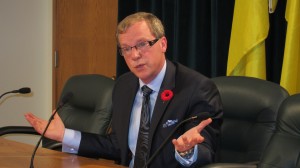 Tommy Douglas, father of Medicare, would have spit out his coffee. The Saskatchewan Premier said,
Tommy Douglas, father of Medicare, would have spit out his coffee. The Saskatchewan Premier said,
“When it comes to a choice between prompt diagnostics, prompt surgery … and ideology, the people of this province will choose the diagnostics and the surgery.”
What irony coming from the province that started rationed medical services.
Here’s part of what Brad Wall said on NewsTalk650, radio call-in:
UPDATE: Premier considers private MRI clinics to decrease wait times
Reported by News Talk Radio staff
Premier Brad Wall is floating the idea of allowing access to private MRI clinics in Saskatchewan to reduce wait times for diagnostic procedures.
On John Gormley Live Thursday, Wall said it’s something that deserves “serious consideration.”
“I will not rule it out. When it comes to a choice between prompt diagnostics, prompt surgery … and ideology, the people of this province will choose the diagnostics and the surgery,” Wall said.
Wall was responding to a question from a caller on the show who said the three-month wait list for an MRI scan through the public system, could have been avoided had he been allowed to pay for the procedure at a private clinic in Regina.
“We allow more private operators on the surgery side. That’s why we’ve seen wait times come down for surgeries … can it work on the diagnostic side? These are the questions we’re asking now and I think this is something that deserves consideration,” Wall said.
The government currently utilizes the private sector for some surgeries, but Wall said the province has built in a barrier that prevents private providers from robbing front line staff from the public system.
“If we can do that with diagnostics, with MRIs does it make sense that the wait list is going to shrink because those who want to pay will come off that public wait list. And thereby shortening the wait list for all, whether they wish to pay or not.”
The NDP responded with, “We want the government to build the capacity in a public system so that all people, regardless of how much money you make, gets the care necessary in a timely fashion.” The NDP did not comment on people travelling out of country to purchase care right now. How equitable is that? (See more media coverage from CBC.)
Healthcare Ideology
Napoleon first criticized his opponents as ideologues: those who hold rigid, inflexible opinions resisting change. (Merriam-Webster for more definitions)
You might be a healthcare ideologue if:
- You defend the status quo as long as “all people” get the same service regardless of quality
- You berate patients for accessing care (“Those patients should have treated their minor illness at home!”)
- You support sending patients away from emergency and clinics if a nurse deems the symptoms trivial
- You criticize patients as system abusers when worry drives them to seek reassurance
- You believe it’s okay to mislead voters with sound bites so long as it increases support for ideology
- You disparage physicians who question the status quo
- You march, chant and fight to protect a system that makes you fat while letting patients languish on wait lists
Without ideology, our system might change and look like the – Gasp! – German, Swedish, British, or any other patient focused system.
Positive Ideology?
Is there nothing worth fighting for?
Of course: patients; access to care that meets their concerns; safe, timely care that provides an outstanding patient experience. But this is vague; tough to make into ideology. It requires patient input and opinion, innovation and creativity. It demands change to improve things for patients, not just more money to patch an over-capacity lifeboat.
Ideology grows much easier from rigid legislation and crisp social planning.
Safety in High Risk Environments
A parachute that fails only a few people is worthless. Medicare cannot just be great most of the time. It must excel at meeting patient’s greatest needs 100%. It needs a back up, maybe many levels of back-up. Medicare needs safety systems that guarantee patients never wait beyond what’s safe, never need to endure an intolerable care experience.
Are you a healthcare ideologue? Are you focused on patients or legislation?
photocredit: newstalk650.com
